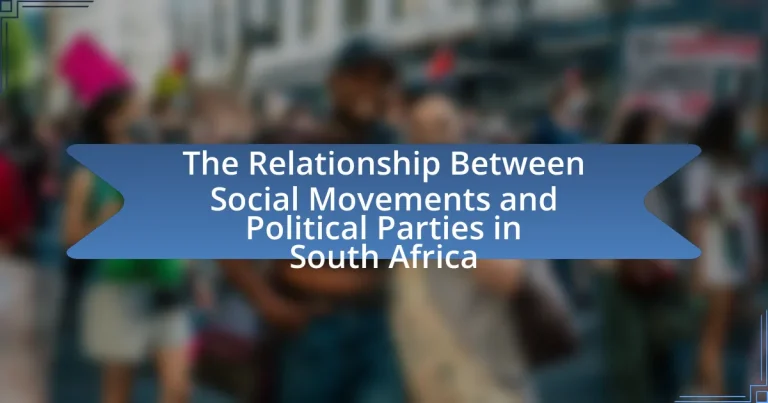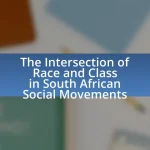The article examines the intricate relationship between social movements and political parties in South Africa, highlighting how social movements influence political agendas and compel parties to respond to societal demands. It discusses historical examples, such as the anti-apartheid movement’s impact on the African National Congress (ANC), and contemporary movements like Fees Must Fall, which address issues of education funding and inequality. The article further explores the roles political parties play in supporting or hindering social movements, the implications of their involvement for democracy and governance, and the challenges faced by both entities in their interactions. Key characteristics and strategies of social movements, as well as the responses of political parties, are analyzed to illustrate the ongoing dynamics shaping South Africa’s political landscape.
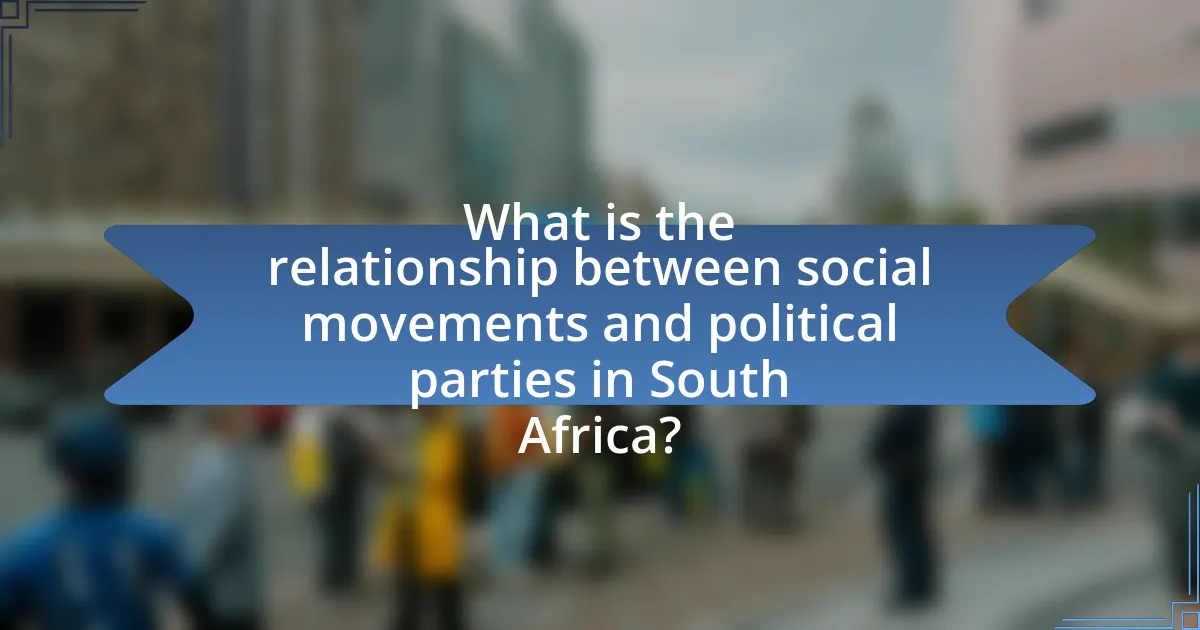
What is the relationship between social movements and political parties in South Africa?
Social movements and political parties in South Africa have a complex and interdependent relationship, where social movements often influence political agendas and parties respond to the demands of these movements. For instance, the anti-apartheid movement significantly shaped the African National Congress’s (ANC) policies and strategies, leading to the party’s eventual dominance in post-apartheid South Africa. Additionally, contemporary social movements, such as the Fees Must Fall movement, have pressured political parties to address issues like education funding and inequality, demonstrating how grassroots activism can drive political change. This dynamic illustrates that while political parties can provide a platform for social movements, the latter can also hold parties accountable and push for reforms that align with their goals.
How have social movements influenced political parties in South Africa?
Social movements have significantly influenced political parties in South Africa by shaping their policies and electoral strategies. For instance, the anti-apartheid movement mobilized mass support and led to the formation of the African National Congress (ANC) as a dominant political force. Additionally, contemporary movements like the Fees Must Fall campaign have pressured political parties to address issues such as education funding and access. The ANC, responding to these movements, has adapted its policies to align with the demands of the populace, demonstrating the direct impact of social activism on party platforms and political discourse.
What historical examples illustrate this influence?
The influence of social movements on political parties in South Africa is illustrated by the anti-apartheid movement, particularly through the African National Congress (ANC) and the United Democratic Front (UDF). The ANC, which became the leading political party in the struggle against apartheid, was significantly shaped by grassroots activism and mass mobilization efforts led by social movements. For instance, the UDF, formed in 1983, united various anti-apartheid groups and played a crucial role in organizing protests and campaigns that pressured the government for change. This collective action culminated in the eventual dismantling of apartheid laws and the establishment of a democratic government in 1994, demonstrating the direct impact of social movements on political party agendas and policies.
How do social movements shape party platforms and policies?
Social movements shape party platforms and policies by mobilizing public opinion and advocating for specific issues, which political parties often adopt to gain electoral support. For instance, the anti-apartheid movement significantly influenced the African National Congress (ANC) platform, leading to policies focused on racial equality and social justice. Additionally, contemporary movements like the Fees Must Fall campaign have pressured political parties to address education funding and access, demonstrating how grassroots activism can directly impact legislative agendas. This dynamic illustrates the reciprocal relationship where social movements not only reflect societal demands but also compel political parties to adapt their platforms to remain relevant and responsive to constituents.
What role do political parties play in social movements?
Political parties play a crucial role in social movements by providing organizational support, resources, and political legitimacy. They often amplify the voices of social movements, helping to translate grassroots demands into formal political agendas. For instance, in South Africa, the African National Congress (ANC) historically aligned with anti-apartheid movements, facilitating their goals through political representation and legislative action. This relationship is evidenced by the ANC’s incorporation of social movement issues into its policies post-1994, demonstrating how political parties can enhance the effectiveness and reach of social movements.
How do political parties support or hinder social movements?
Political parties can support social movements by providing resources, legitimacy, and political platforms, while they can hinder these movements by co-opting their agendas or suppressing dissent. For instance, in South Africa, the African National Congress (ANC) has historically aligned with social movements like the anti-apartheid struggle, offering political support and integrating their goals into national policy. Conversely, the ANC has also faced criticism for marginalizing grassroots movements, such as the Fees Must Fall campaign, by prioritizing political stability over social demands. This dual role illustrates how political parties can both empower and constrain social movements, depending on their strategic interests and the political context.
What are the implications of party involvement in social movements?
Party involvement in social movements can significantly influence the direction and effectiveness of those movements. Political parties can provide resources, organizational support, and legitimacy to social movements, which can enhance their visibility and impact. For instance, in South Africa, the African National Congress (ANC) has historically engaged with social movements, which has helped to amplify issues such as land reform and social justice. This involvement can lead to greater political pressure on the government to address the concerns raised by these movements. However, party involvement can also lead to co-optation, where the original goals of the social movement may be diluted or redirected to align with party agendas, potentially undermining grassroots activism. This duality illustrates the complex relationship between political parties and social movements, where both collaboration and conflict can shape outcomes.
Why is the relationship between social movements and political parties significant in South Africa?
The relationship between social movements and political parties in South Africa is significant because it shapes the political landscape and influences policy-making. Social movements often emerge to address social injustices and mobilize public opinion, which can pressure political parties to adopt specific agendas or reforms. For instance, the anti-apartheid movement, led by organizations like the African National Congress (ANC) and supported by various grassroots movements, played a crucial role in dismantling apartheid and establishing a democratic government. This historical context illustrates how social movements can drive political change and compel parties to respond to the needs of marginalized communities. Additionally, contemporary movements, such as those advocating for land reform and economic justice, continue to impact party platforms and electoral strategies, demonstrating the ongoing relevance of this relationship in South Africa’s democracy.
What impact does this relationship have on democracy and governance?
The relationship between social movements and political parties in South Africa significantly enhances democracy and governance by fostering greater political participation and accountability. Social movements mobilize citizens around specific issues, which pressures political parties to address these concerns in their platforms and policies. For instance, the rise of movements like the Treatment Action Campaign has led to increased government responsiveness regarding healthcare policies, demonstrating how grassroots activism can influence legislative change. This dynamic interaction encourages a more vibrant democratic process, as it compels political parties to remain attuned to the needs and demands of the populace, ultimately leading to improved governance outcomes.
How does this relationship affect social justice and equality?
The relationship between social movements and political parties in South Africa significantly impacts social justice and equality by shaping policy agendas and mobilizing public support for marginalized communities. Social movements often advocate for the rights of disadvantaged groups, influencing political parties to adopt more inclusive policies. For instance, the anti-apartheid movement led to the establishment of a democratic government that aimed to rectify historical injustices, resulting in policies like affirmative action and land reform. These movements hold political parties accountable, ensuring that issues of inequality are addressed in legislative frameworks, thereby promoting social justice.
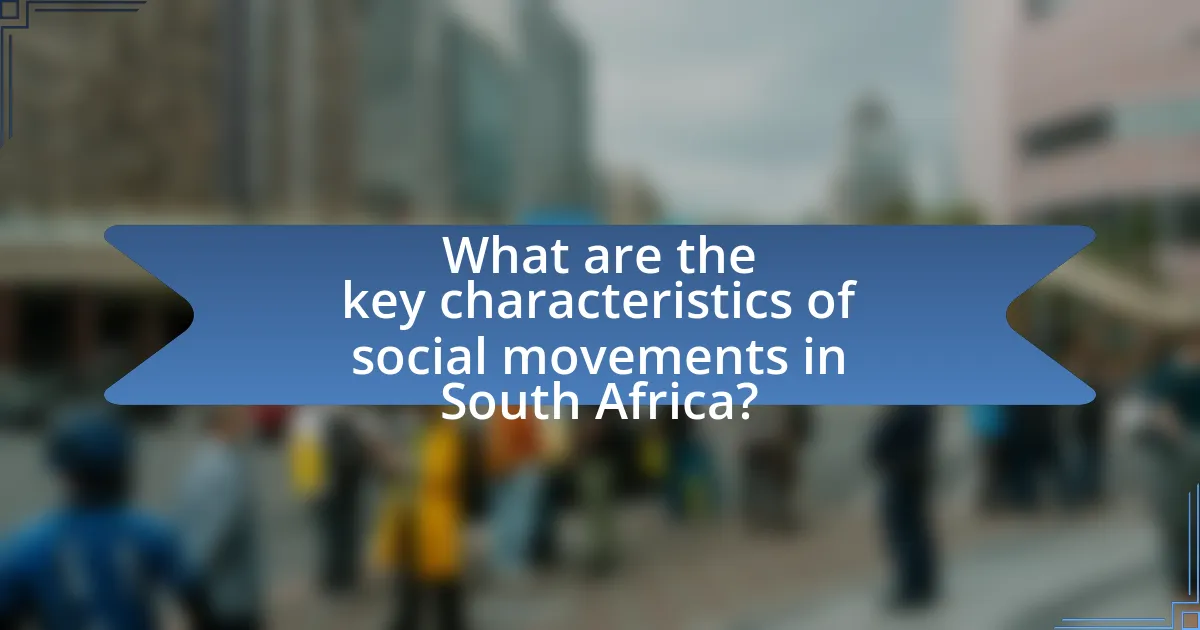
What are the key characteristics of social movements in South Africa?
Key characteristics of social movements in South Africa include a focus on social justice, grassroots mobilization, and a strong connection to historical struggles against apartheid. Social movements often address issues such as inequality, human rights, and environmental concerns, reflecting the diverse needs of marginalized communities. For example, movements like the Treatment Action Campaign have successfully advocated for access to HIV/AIDS treatment, demonstrating the effectiveness of collective action in influencing policy. Additionally, social movements in South Africa frequently engage in coalition-building with political parties, enhancing their impact on the political landscape.
What types of social movements exist in South Africa?
In South Africa, there are several types of social movements, including labor movements, environmental movements, anti-apartheid movements, and community-based movements. Labor movements, such as the Congress of South African Trade Unions (COSATU), advocate for workers’ rights and better working conditions. Environmental movements focus on issues like climate change and conservation, exemplified by organizations like Greenpeace Africa. Anti-apartheid movements, historically significant, aimed to dismantle racial segregation and promote equality, with groups like the African National Congress (ANC) playing a pivotal role. Community-based movements address local issues, such as housing and service delivery, often mobilizing residents to demand government accountability. These movements reflect the diverse social and political landscape of South Africa, each contributing to the ongoing struggle for justice and equality.
How do these movements differ in their goals and methods?
Social movements in South Africa differ from political parties in their goals and methods primarily in their focus and approach to change. Social movements aim for broad societal transformation, often addressing issues like inequality, human rights, and environmental justice through grassroots mobilization and activism. For example, the Treatment Action Campaign (TAC) focused on HIV/AIDS awareness and access to treatment, employing protests and public education to influence policy. In contrast, political parties seek to gain power within the existing political system, aiming to implement specific policies through electoral processes and governance. The African National Congress (ANC), for instance, operates within formal political structures to enact legislation and govern, reflecting a more institutionalized method of achieving change. This distinction highlights that while social movements prioritize direct action and community engagement, political parties emphasize electoral strategy and legislative processes.
What are some prominent examples of social movements in South Africa?
Prominent examples of social movements in South Africa include the Anti-Apartheid Movement, the Fees Must Fall Movement, and the Landless People’s Movement. The Anti-Apartheid Movement, which gained international attention, was pivotal in the struggle against racial segregation and led to the end of apartheid in the early 1990s. The Fees Must Fall Movement emerged in 2015, advocating for free education and addressing the financial burdens on students, significantly impacting higher education policies. The Landless People’s Movement, founded in 1997, focuses on land reform and the rights of landless individuals, highlighting ongoing issues of land inequality in post-apartheid South Africa. These movements illustrate the dynamic relationship between social activism and political change in the country.
How do social movements mobilize support in South Africa?
Social movements in South Africa mobilize support through grassroots organizing, strategic use of social media, and coalition-building with political parties and civil society organizations. Grassroots organizing involves community engagement, where movements like the Fees Must Fall campaign effectively mobilized students by addressing educational inequalities and leveraging collective action. Social media platforms serve as vital tools for spreading awareness and rallying support, exemplified by movements that utilize hashtags to create viral campaigns. Additionally, forming coalitions with political parties enhances their visibility and influence, as seen in the collaboration between social movements and the Economic Freedom Fighters to advocate for land reform. These strategies collectively strengthen the movements’ ability to garner widespread support and effect change.
What strategies do they use to engage communities?
Social movements in South Africa engage communities through grassroots organizing, coalition building, and advocacy campaigns. Grassroots organizing involves mobilizing local residents to participate in community meetings and actions, fostering a sense of ownership and empowerment. Coalition building occurs when social movements partner with various organizations, including NGOs and political parties, to amplify their voices and resources. Advocacy campaigns focus on raising awareness about specific issues, such as social justice and inequality, often utilizing social media and public demonstrations to reach a wider audience. These strategies have been effective in mobilizing community support and influencing political discourse, as evidenced by the success of movements like the Fees Must Fall campaign, which significantly impacted higher education policies in South Africa.
How do social media and technology influence mobilization efforts?
Social media and technology significantly enhance mobilization efforts by facilitating rapid communication and broadening outreach. These platforms enable activists to organize events, share information, and galvanize support quickly, as evidenced by the role of Twitter and Facebook in the 2011 South African student protests, where thousands mobilized in response to online calls for action. Additionally, technology allows for real-time updates and coordination, which increases participation rates and fosters a sense of community among supporters. The ability to disseminate information widely and engage with diverse audiences has transformed traditional mobilization strategies, making them more effective in contemporary social movements.
What challenges do social movements face in South Africa?
Social movements in South Africa face significant challenges, including state repression, internal fragmentation, and limited access to resources. State repression manifests through police violence and legal restrictions, which hinder the ability of movements to organize and protest effectively. Internal fragmentation occurs when differing ideologies and goals among movement members lead to disunity, weakening their collective impact. Additionally, many social movements struggle with limited financial and logistical resources, which restricts their capacity to mobilize support and sustain long-term campaigns. These challenges are compounded by the complex political landscape, where social movements often find themselves at odds with established political parties, leading to further marginalization.
How do political repression and state responses affect these movements?
Political repression and state responses significantly impact social movements by either stifling their activities or galvanizing public support. When governments employ tactics such as censorship, arrests, or violence against activists, it often leads to increased solidarity among movement participants and can attract broader public sympathy, as seen during the anti-apartheid struggle in South Africa. Conversely, excessive repression can lead to fragmentation and demobilization of movements, as individuals may fear repercussions. Historical evidence shows that the state’s violent crackdown on protests often results in heightened visibility for the movements, as media coverage amplifies their cause, thereby influencing public opinion and political discourse.
What internal challenges do social movements encounter?
Social movements encounter internal challenges such as fragmentation, leadership disputes, and ideological differences. Fragmentation occurs when various factions within a movement prioritize their own agendas over collective goals, leading to weakened unity and effectiveness. Leadership disputes can arise when there are competing visions or styles of leadership, causing divisions and hindering decision-making processes. Additionally, ideological differences among members can create conflicts regarding strategies and objectives, making it difficult to maintain a cohesive approach. These internal challenges can significantly impact the overall success and sustainability of social movements in South Africa.
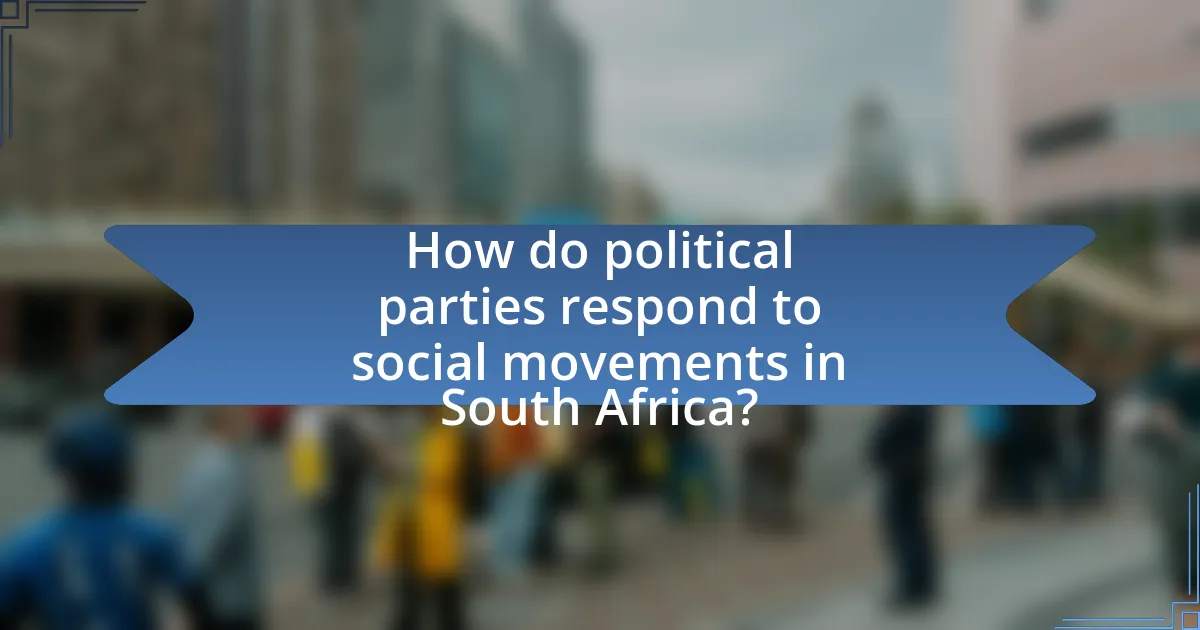
How do political parties respond to social movements in South Africa?
Political parties in South Africa respond to social movements through a combination of engagement, co-optation, and opposition. For instance, the African National Congress (ANC) has historically engaged with social movements like the Treatment Action Campaign, which advocated for access to HIV/AIDS treatment, by incorporating their demands into policy frameworks. Conversely, parties may also co-opt social movements to gain electoral support, as seen when the Economic Freedom Fighters (EFF) aligned with student protests to bolster their political capital. Additionally, some parties may oppose movements that challenge their authority or policies, leading to tensions, as observed during the protests against police brutality. These responses illustrate the complex dynamics between political parties and social movements in South Africa, shaped by historical context and current political landscapes.
What strategies do political parties employ to engage with social movements?
Political parties in South Africa engage with social movements through strategies such as coalition-building, policy alignment, and grassroots mobilization. Coalition-building involves forming alliances with social movements to amplify shared goals, as seen in the partnership between the Economic Freedom Fighters and various labor movements. Policy alignment occurs when parties adopt the demands of social movements into their platforms, which can be observed in the African National Congress incorporating anti-privatization stances from social movements into their policies. Grassroots mobilization is another strategy, where parties actively participate in social movement events to demonstrate solidarity and gain support, exemplified by the Democratic Alliance’s involvement in protests against service delivery failures. These strategies enable political parties to leverage the influence of social movements to enhance their political capital and address societal issues.
How do parties incorporate social movement agendas into their platforms?
Political parties in South Africa incorporate social movement agendas into their platforms by aligning their policies with the demands and goals of these movements. This alignment often occurs through formal partnerships, where parties adopt specific social movement issues, such as land reform or gender equality, into their manifestos to attract voter support. For instance, the African National Congress (ANC) has historically integrated the anti-apartheid movement’s principles into its platform, emphasizing social justice and equality. Additionally, parties may engage in dialogue with social movement leaders to ensure that their platforms reflect grassroots concerns, thereby enhancing their legitimacy and appeal among constituents. This strategy is evident in the way the Economic Freedom Fighters (EFF) has embraced the land expropriation without compensation agenda, which resonates with the broader social movement advocating for land rights.
What are the risks and benefits of aligning with social movements?
Aligning with social movements presents both risks and benefits for political parties in South Africa. The primary benefit is enhanced legitimacy and support, as political parties can gain credibility by associating with grassroots movements that resonate with public concerns, such as inequality and social justice. For instance, the African National Congress (ANC) historically benefited from its alignment with anti-apartheid movements, which solidified its position as a champion of democracy and human rights.
Conversely, the risks include potential alienation of traditional party bases and the possibility of being co-opted by movements that may not align with the party’s core values or strategic goals. For example, the Economic Freedom Fighters (EFF) faced challenges in maintaining coherence between their party agenda and the diverse demands of various social movements, which could lead to internal conflicts and diluted messaging. Thus, while aligning with social movements can amplify a party’s voice and relevance, it also requires careful navigation of ideological and strategic complexities.
How do political parties react to opposition from social movements?
Political parties in South Africa often respond to opposition from social movements through a combination of co-optation, repression, and dialogue. Co-optation occurs when parties adopt the demands or rhetoric of social movements to neutralize their influence, as seen with the African National Congress (ANC) incorporating elements of the anti-apartheid movement into its platform after gaining power. Repression may involve the use of state security forces to suppress protests, which has been documented in instances where the police have clashed with demonstrators advocating for social justice. Dialogue is another approach, where parties engage with movement leaders to address grievances, exemplified by the ANC’s attempts to communicate with groups like the Economic Freedom Fighters (EFF) regarding economic inequality. These varied responses reflect the complex dynamics between political parties and social movements in South Africa’s evolving political landscape.
What tactics do parties use to counteract social movements?
Political parties in South Africa use various tactics to counteract social movements, including co-optation, repression, and strategic communication. Co-optation involves integrating elements of social movements into party platforms to neutralize their demands, as seen when parties adopt popular movement agendas to gain support. Repression includes the use of police force or legal measures to suppress protests, which has been evident in instances where law enforcement intervened during demonstrations. Strategic communication entails framing narratives to discredit movements, often portraying them as radical or unrepresentative of broader public interests, thereby undermining their legitimacy. These tactics reflect the ongoing dynamic between political parties and social movements in South Africa, where parties seek to maintain control and influence over public discourse and policy.
How does public opinion influence party responses to social movements?
Public opinion significantly influences party responses to social movements by shaping political agendas and electoral strategies. When a social movement gains traction and public support, political parties often align their policies and rhetoric to resonate with the prevailing sentiments of the electorate. For instance, during the anti-apartheid movement in South Africa, parties that advocated for racial equality and justice garnered substantial public backing, leading to their electoral success. This demonstrates that parties are likely to respond to social movements that reflect the concerns and values of the public, as seen in the increased support for the African National Congress during the 1990s, which capitalized on widespread public discontent with apartheid.
What lessons can be learned from the relationship between social movements and political parties in South Africa?
The relationship between social movements and political parties in South Africa teaches that social movements can significantly influence political agendas and party policies. For instance, the anti-apartheid movement, led by organizations like the African National Congress (ANC) and supported by grassroots activism, played a crucial role in shaping the political landscape and ultimately led to the end of apartheid in 1994. This demonstrates that social movements can mobilize public support and pressure political parties to adopt progressive policies. Additionally, the ongoing struggles for land reform and social justice highlight that social movements continue to hold political parties accountable, ensuring that they address the needs of marginalized communities. This dynamic illustrates the importance of collaboration and tension between social movements and political parties in driving social change in South Africa.
What best practices can enhance collaboration between social movements and political parties?
Best practices that can enhance collaboration between social movements and political parties include establishing clear communication channels, aligning goals and objectives, and fostering mutual respect. Clear communication ensures that both parties understand each other’s priorities and strategies, which is essential for effective collaboration. Aligning goals allows social movements and political parties to work towards common objectives, increasing the likelihood of successful outcomes. Fostering mutual respect creates a collaborative environment where both entities value each other’s contributions, leading to stronger partnerships. Historical examples in South Africa, such as the collaboration between the anti-apartheid movement and the African National Congress, demonstrate that these practices can lead to significant political change.
How can understanding this relationship inform future political strategies?
Understanding the relationship between social movements and political parties in South Africa can inform future political strategies by highlighting the need for collaboration and responsiveness to grassroots issues. Political parties that engage with social movements can better align their policies with the demands of the electorate, as evidenced by the success of the Economic Freedom Fighters, which emerged from social movements advocating for economic justice. This alignment can enhance voter mobilization and trust, as seen in the 2019 elections where parties that addressed social movement concerns gained significant support. Therefore, recognizing this relationship allows political entities to craft strategies that resonate with the public, ultimately leading to more effective governance and increased electoral success.
